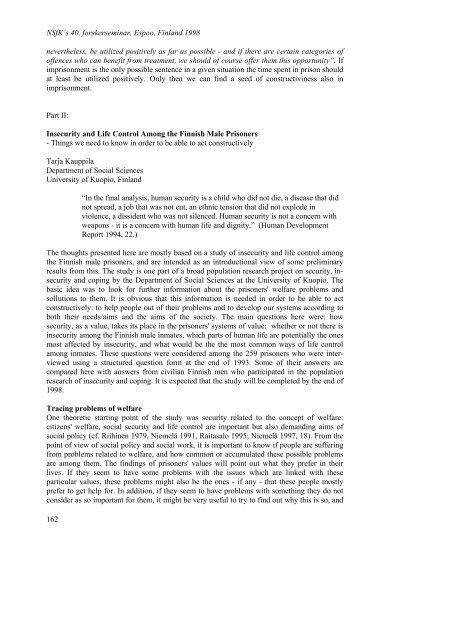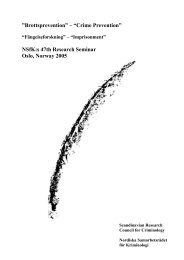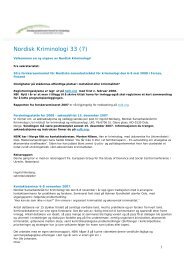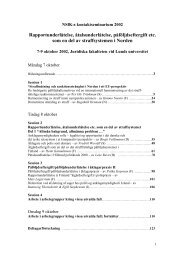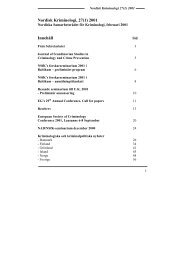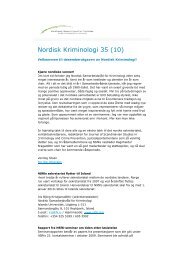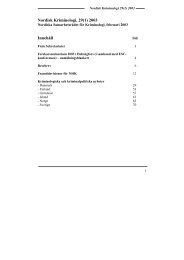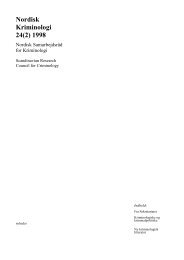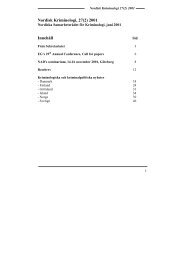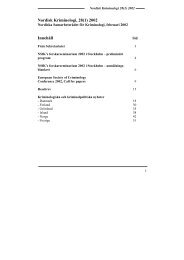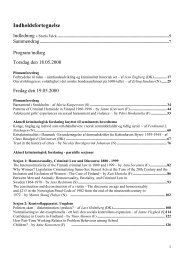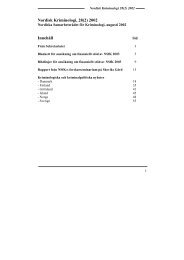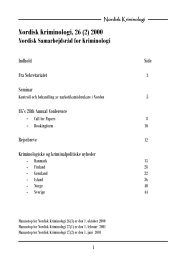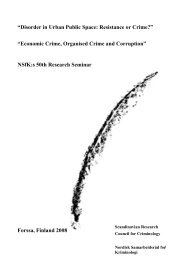Organised Crime & Crime Prevention - what works? - Scandinavian ...
Organised Crime & Crime Prevention - what works? - Scandinavian ...
Organised Crime & Crime Prevention - what works? - Scandinavian ...
Create successful ePaper yourself
Turn your PDF publications into a flip-book with our unique Google optimized e-Paper software.
NSfK´s 40. forskerseminar, Espoo, Finland 1998<br />
nevertheless, be utilized positively as far as possible - and if there are certain categories of<br />
offences who can benefit from treatment, we should of course offer them this opportunity”. If<br />
imprisonment is the only possible sentence in a given situation the time spent in prison should<br />
at least be utilized positively. Only then we can find a seed of constructiviness also in<br />
imprisonment.<br />
Part II:<br />
Insecurity and Life Control Among the Finnish Male Prisoners<br />
- Things we need to know in order to be able to act constructively<br />
Tarja Kauppila<br />
Department of Social Sciences<br />
University of Kuopio, Finland<br />
162<br />
“In the final analysis, human security is a child who did not die, a disease that did<br />
not spread, a job that was not cut, an ethnic tension that did not explode in<br />
violence, a dissident who was not silenced. Human security is not a concern with<br />
weapons - it is a concern with human life and dignity.” (Human Development<br />
Report 1994, 22.)<br />
The thoughts presented here are mostly based on a study of insecurity and life control among<br />
the Finnish male prisoners, and are intended as an introductional view of some preliminary<br />
results from this. The study is one part of a broad population research project on security, insecurity<br />
and coping by the Department of Social Sciences at the University of Kuopio. The<br />
basic idea was to look for further information about the prisoners' welfare problems and<br />
sollutions to them. It is obvious that this information is needed in order to be able to act<br />
constructively: to help people out of their problems and to develop our systems according to<br />
both their needs/aims and the aims of the society. The main questions here were: how<br />
security, as a value, takes its place in the prisoners' systems of value; whether or not there is<br />
insecurity among the Finnish male inmates, which parts of human life are potentially the ones<br />
most affected by insecurity, and <strong>what</strong> would be the the most common ways of life control<br />
among inmates. These questions were considered among the 259 prisoners who were interviewed<br />
using a structured question form at the end of 1993. Some of their answers are<br />
compared here with answers from civilian Finnish men who participated in the population<br />
research of insecurity and coping. It is expected that the study will be completed by the end of<br />
1998.<br />
Tracing problems of welfare<br />
One theoretic starting point of the study was security related to the concept of welfare:<br />
citizens' welfare, social security and life control are important but also demanding aims of<br />
social policy (cf. Riihinen 1979, Niemelä 1991, Raitasalo 1995; Niemelä 1997, 18). From the<br />
point of view of social policy and social work, it is important to know if people are suffering<br />
from problems related to welfare, and how common or accumulated these possible problems<br />
are among them. The findings of prisoners' values will point out <strong>what</strong> they prefer in their<br />
lives. If they seem to have some problems with the issues which are linked with these<br />
particular values, these problems might also be the ones - if any - that these people mostly<br />
prefer to get help for. In addition, if they seem to have problems with something they do not<br />
consider as so important for them, it might be very useful to try to find out why this is so, and


